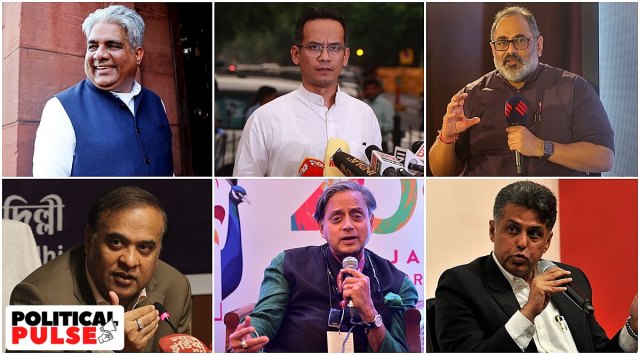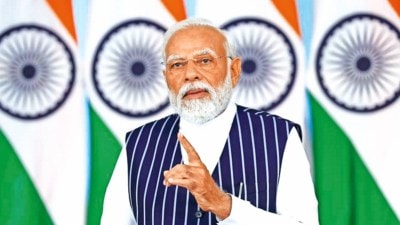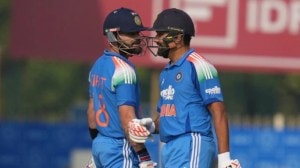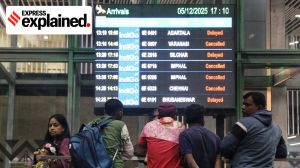India by end of the decade: ‘Anchor in multipolar world’, ‘fewer regional disparities’ — six leaders share their vision
From Assam CM Himanta Biswa Sarma to Congress MP Shashi Tharoor, on 77th Independence Day political leaders across the divide share where they wish to see India by 2030.
 Top (L-R) Bhupender Yadav, Gaurav Gogoi and Rajeev Chandrasekhar; Bottom (L-R) Himanta Biswa Sarma, Shashi Tharoor and Manish Tewari. (Express photos)
Top (L-R) Bhupender Yadav, Gaurav Gogoi and Rajeev Chandrasekhar; Bottom (L-R) Himanta Biswa Sarma, Shashi Tharoor and Manish Tewari. (Express photos)
In his Independence Day speech, Prime Minister Narendra Modi said India would strengthen its global economic standing in the next five years. “We built a strong economy, stopped leakages. I am giving an account of 10 years from the Red Fort. It is Modi’s guarantee that India will become the third-largest global economy in the next five years,” the PM said Tuesday.
With a GDP of $3.7 trillion, India recently overtook the United Kingdom to become the world’s fifth-largest economy. The government set a target to become a $5-trillion economy by 2022. But according to a State Bank of India report, the country is set to overtake Germany ($4.3 trillion) and Japan ($4.4 trillion) to become the third-largest economy by the end of the decade, trailing only the United States and China.
On the occasion of Independence Day, The Indian Express asked three BJP leaders and three from the Congress about where they want to see India by the end of the decade.
Bhupender Yadav, Union Environment Minister (BJP)
“I want to see India become a leader for environment-friendly life. More wisdom for human beings to understand life and its values for Vasudhaiva Kutumbakam (the world is one family). India should be a place that would guide the world in Indic philosophy in a scientific manner.”
Gaurav Gogoi, Congress deputy leader in the Lok Sabha
“India in 2030 is following ‘Non-Alignment 3.0’ in its geopolitics. Western Europe will be a major defence partner, especially Germany and France. A global framework for continental Asia will have been designed in consultation with India, Japan, Thailand, South Korea, Nepal and Bangladesh. Indian companies and professionals will make successful inroads into new markets in Eastern Europe, the Middle East and Africa.”
Rajeev Chandrasekhar, Union Minister of State for Information Technology (BJP)
“In the last nine years, India’s economy, financial sector, and entrepreneurship have undergone a deep and permanent transformation. From being an outlier in the global economy, we are in pole position now, becoming the fastest-growing, most exciting and fifth-largest economy in the world.
“Thanks to the work of PM Narendra Modi, India in 2030 will be among the top three economies of the world, the world’s largest digital and innovation economy, a significant and trusted hub for global electronics supply chains, the largest connected country with the largest infrastructure network, and on the brink of attaining ‘developed nation’ status with a GDP of more than $10 trillion, more than doubling from where we are today.”
Himanta Biswa Sarma, Assam Chief Minister (BJP)
“I want to see India at the top. It should be the third-largest economy. Inside our country, the regional disparities should be reduced — growth and prosperity must exhibit regional balance. My India should see that women are empowered, economically and socially, with harmful practices such as polygamy eradicated. India should have a Uniform Civil Code to ensure gender justice and equality.”
Shashi Tharoor, Thiruvananthapuram MP (Congress)
“I would like to see an India where all communities, castes, and creeds live in harmony, where every Indian has the security of a roof over their head, a decent job, healthcare, sanitation facilities, and the prospect of dreaming of a better life for their children. I would like to see an India where, in addition to the hardware of development (roads, ports, highways, railways, airports), we also pay attention to the software of development — the human capital, which is what our progress should be all about. Better education and skill development so that our young people can take advantage of the opportunities that the world will offer them in the future.”
Manish Tewari, Anandpur Sahib MP (Congress)
“When India enters the third decade of the 21st century, by logical progression, we would be a $5-trillion economy. The challenge, therefore, would then be the equitable distribution of wealth and income that mitigates the scourge of inequality. The central challenge would be to move India from a low-income country to a middle-income country. It is only when the middle is broad — affluent and resilient enough to absorb external shocks, which can force people back into poverty as we saw with Covid-19 — that you can claim you are on a path of equality and egalitarianism.
India post-2030 must be characterised by a democracy where the political parties that underpin it are internally democratic, there is real redistribution of wealth and income, and money is not concentrated in the hands of the very few, as is the case today. There must be social cohesion, peace and harmony in the country where people of different castes, religions, regions and ethnicities live in tranquillity and where you do not have the kind of violence that has ripped society in Manipur asunder. And in the international arena, India must not only be able to punch to its weight but also become an effective anchor in a world where multipolarity is the reality.”
(As told to Liz Mathew and Manoj C G)
- 01
- 02
- 03
- 04
- 05































